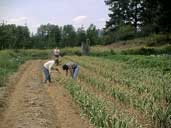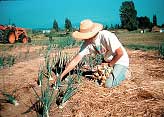 |
 |
 |
 |
 |
 |
 |
 |
 |
 |
|
The Grower's CollectiveWe have a goal of becoming a sustainable small acreage farm. This means being able to maintain our land using organic methods, bringing in as little off farm input as possible and earning an income that will support our family and the future of Greentree Naturals. We have a little over twelve and a half acres, with two and a half in production. We have managed to create a market for most of what we grow. Actually, the market calls for more than what we can grow. Our garlic is usually sold when it is planted, and we always have a waiting list. Our produce and flower subscription service has a long waiting list of customers wanting to be supportive consumers. After a couple of years of selling to the restaurants, new restaurants were calling and we had to turn them away because we could not produce enough product. In 1998, as the orders for certified organic produce continued to increase in our local community, I started making purchases from other certified organic growers at the farmers market to fill our orders. It seemed that the more I was able to provide, the more our customers wanted! The growers I was buying from were very happy to be increasing their weekly sales and were anxious to have someone they trusted marketing for them. And so, the Growers Collective was developed. By ourselves, we couldn’t meet the demands of the market, but by working with others, we are able to provide the quantities needed. With a Collective of five farms, we had seven acres in production instead of just two and a half at one location.
As the manager of the Growers Collective, I did all of the marketing and distribution of the produce. With this responsibility, Greentree Naturals maintained business insurance that provided the liability protection for our small farm enterprise and all of the produce sold. For marketing for the Collective, I received a percentage of the sales (15 – 20% off retail sale price). I strongly believe that the person growing the produce should be receiving most of the money. As it is, when the Collective made deliveries to me, often I still had to bag it, weigh it, make out invoices and deliver the weekly orders. We always made an effort to talk about our expectations and above all, be honest with each other. The Collective was founded on a strong trust relationship, which helped make this endeavor successful. It is important to us that our customers know where their produce is coming from. While marketing and sales go out on the invoice as Greentree Naturals, we always let the buyers know that the delivery was a combination of the Collective growing efforts. With our CSA program, each delivery has a weekly newsletter that identifies each farm’s contribution to the weekly produce delivery. For example, onions came from Almost Eden Farm, some of the summer squash came from Rivendell Farm and Greentree Naturals and so forth. Each farm in the Growers Collective had a different elevation or aspect, which enabled us to extend the availability of crops. When our peas were at the end of their harvest at Greentree Naturals, another farm was just beginning to harvest theirs! Because of our different micro-climates and soil types, each location had unique growing conditions. Almost Eden Farm, for example, grows fantastic onions and carrots, but often has a mid-summer frost that damages more tender crops. So, Mikki was the primary supplier of carrots and onions for the group. The Growers Collective started up in 1998 by working with five other small acreage farms. Over the course of eight years, different farmers joined the Collective as others fell out of farming all together. A couple of growers tried it for only a year or two, finding it was too much work for too little money; one family sold their farm and moved to Hawaii to enjoy warmer weather; another has decided not to pursue market gardening any longer due to a divorce; another has chosen to work off the farm for a more secure, full time income and most recently, one farm has grown large enough to take on their own restaurant and farmers market sales. We feel that this model worked well for all those involved. The fact that we started with five small acreage farms and some have decided that they will no longer grow for market is a reality that we see all the time. Being a farmer is not an easy way of life. It means thousands of hours bending over to plant or harvest during the season, and then when you are done in the fields, you have another thousand hours to wash, weigh and bag everything. And when this is done, then you have to take it somewhere to sell it. We find ourselves constantly struggling to make this a sustainable enterprise. In spite of this, for Greentree Naturals to succeed, we do what has to be done to make our mortgage payments every month. Working with a grower collective has been a positive experience for us and most of the folks that we have worked with. The following are some of the Growers Collective comments about being involved to offer perspective for others who may consider doing a similar venture. Mikki Clark - Almost Eden Farm
"I think marketing as a collective could be a benefit to other growers. A Collective customer is a definite customer. That order needs to be filled, so it helps the farmer to have this type of customer as a base for his sales. At the same time, to have a steady supply of the wide variety of produce that the customers enjoy is not always possible by one single grower - hence, the other growers can cover for each other and keep the produce flowing." “There are times when things are ready all at once in the garden. It is very nice to be able to contribute to the Collective as added sales. It is also good to be able to help fill a gap that others may have in their production, so that the Collective customers have a steady supply. Also, the Collective customers are people who put faith in the farmer and are willing to accept, for the most part, whatever the farmer can produce. I appreciate this willingness and am happy to help provide food to these customers." Linda Watt -Wattcliff Farm
"My garden has always been basically a hobby for me. Of course, we also love all the fresh, organic produce. It benefits my family, our health ,and also financially, as we store a lot of it and can it for winter months. Since I started being involved with the collective, I make a small side income, which is always nice. I am not into this to make my entire living. At this point, it is just fun and a supplement to my income. It also brings satisfaction knowing I am sharing good health and food with others." "My farm is a small rural mountain location, I actually only farm a small part of our fifty acres as most is on a cliff and very rocky. I have .25 acres dedicated to the growing of my produce, and a large yard with many perennial flower beds." "All accounts are set up for you and all the advertising of product. I find that it is very helpful to do this though a collective as all the ground work is done for you. This leaves you with much less to do, since the gardening part and packaging etc. takes up a lot of time."
|
2003 Rapid Lightning Road, Sandpoint, Idaho 83864 • 208-263-8957 • info@greentreenaturals.com
Site Design by Logical Expressions, Inc.



 Working together allowed us to fill the larger orders and eliminate competition with each other. The Collective provided a safety net of sorts. If one of the growers had a crop failure, we could count on one of the other farms to meet the order.
Working together allowed us to fill the larger orders and eliminate competition with each other. The Collective provided a safety net of sorts. If one of the growers had a crop failure, we could count on one of the other farms to meet the order. 